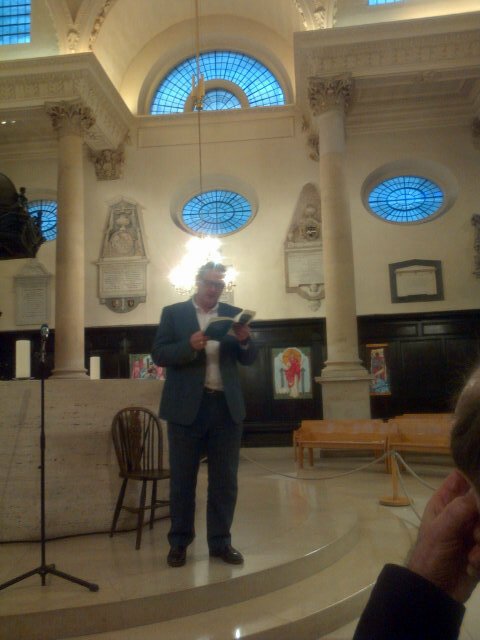
Steven O'Brien began the poetry evening at St Stephen Walbrook, which was organised by The London Magazine during Joe Machine's exhibition 'The Life & Legend of St Stephen'. O'Brien read from his two collections, Dark Hill Dreams and Scrying Stone.
He views public readings as crucial in the process of writing as living work saying "it is an imperative of Creative Writing that it emerges (from its roots in English Literature) with a distinct conceptual style and flavour, in which literary writing can encompass both the creatively critical and the critically creative."
Edward Lucie-Smith read his powerfully intense series of poems about the Srebrenica massacre which took place in Bosnia in 1995 including:
Buried, reburied, unburied,
Stacked up,
Two thousand
Of the nameless,
Waiting for their stolen
Names to be returned to them.
(Edward Lucie-Smith, 6. Bodies at Tuzla)
Joe Machine read poetry and prose included in the monograph on his work. In the book Edward Lucie-Smith writes that:
O'Brien has said that, as Editor of The London Magazine, he looks for:
"Poetry that acknowledges the tropes of the past but offers something fresh in shape, structure and theme. Poetry that shows rather than tells. Poetry that is wholly alive to the possibilities of sensory language, cadences and vivacity of impact."
He encourages poets to: "Read widely and deeply. Serve your poetic apprenticeship, but do not be slavish. Write, write and write. Craft and redraft. Try always to be daring, and specific."
"Poetry that acknowledges the tropes of the past but offers something fresh in shape, structure and theme. Poetry that shows rather than tells. Poetry that is wholly alive to the possibilities of sensory language, cadences and vivacity of impact."
He encourages poets to: "Read widely and deeply. Serve your poetic apprenticeship, but do not be slavish. Write, write and write. Craft and redraft. Try always to be daring, and specific."
Edward Lucie-Smith read his powerfully intense series of poems about the Srebrenica massacre which took place in Bosnia in 1995 including:
Buried, reburied, unburied,
Stacked up,
Two thousand
Of the nameless,
Waiting for their stolen
Names to be returned to them.
(Edward Lucie-Smith, 6. Bodies at Tuzla)
"Joe had an extremely turbulent childhood and youth, marked by many episodes of theft and violence, which continued into his young adulthood. These overlapped with the beginnings of his life as a creative artist and a creative writer.
His first association with other creative spirits was with the poetry group the Medway Poets, who gave regular recitals at venues in the various Medway towns. This group was essentially disenfranchised, and divorced from the sophistication of middle-class literary circles in London. Though Joe Machine did not come into contact with the group until the late 1993, the impulse that led to its formation was rooted in a much earlier epoch. Essentially it could trace its ancestry to the rise of punk rock in the Britain of the mid-1970s."
His first association with other creative spirits was with the poetry group the Medway Poets, who gave regular recitals at venues in the various Medway towns. This group was essentially disenfranchised, and divorced from the sophistication of middle-class literary circles in London. Though Joe Machine did not come into contact with the group until the late 1993, the impulse that led to its formation was rooted in a much earlier epoch. Essentially it could trace its ancestry to the rise of punk rock in the Britain of the mid-1970s."
---------------------------------------------------------------------------------------------
Edward Lucie-Smith - Srebrenica.


No comments:
Post a Comment